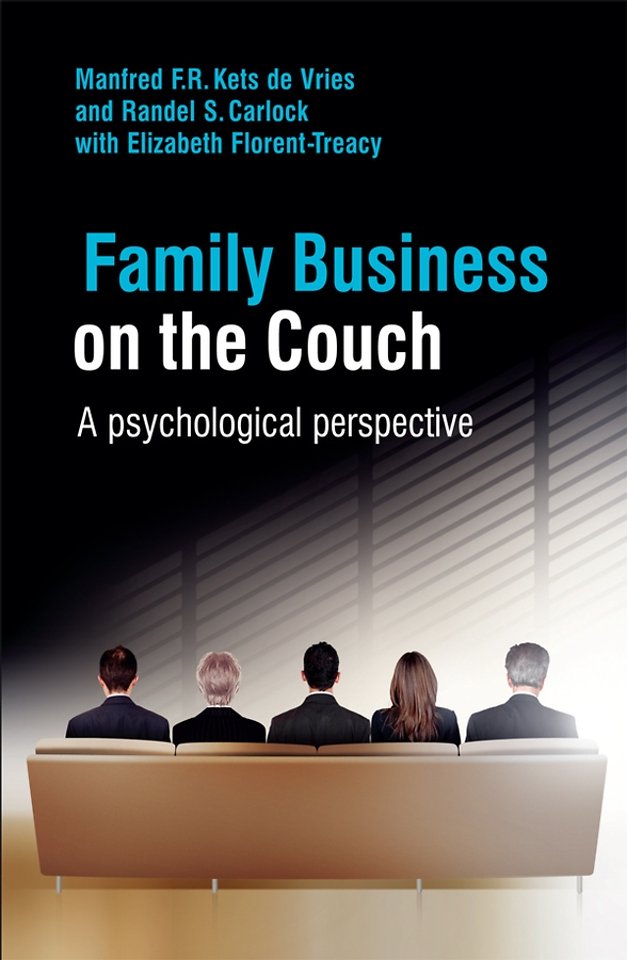


Manfred F.R. Kets de Vries heeft een frisse en unieke kijk op het al vaak beschreven onderwerp leiderschap.
Meer over de auteursFamily Business on the Couch
A psychological perspective
Gebonden Engels 2007 1e druk 9780470516713Samenvatting
De uitdaging van familiebedrijven en hun aandeelhouders is om hun problemen te herkennen, te begrijpen hoe ze strategieën kunnen ontwikkelen om deze aan te pakken en familieverhalen te creëren die de emotionele dimensie van de kwesties aan de familie uitleggen. De meest hardnekkige problemen zijn niet de bedrijfsproblemen die de organisaties tegenkomen, maar de emotionele kwesties die deze verergeren. Het toepassen van psychodynamische concepten zal helpen gedrag uit te leggen en zal de familie de mogelijkheid bieden om zich voor te bereiden op levenscyclustransities en andere problemen die kunnen ontstaan.
Hoewel 'Family Business on the Couch' een conceptuele sectie bevat, is dit vooral een praktisch boek over realistische problemen van familiebedrijven.
Specificaties
Lezersrecensies
Inhoudsopgave
Acknowledgements
PART I: QUESTIONS AND OBSERVATIONS
Introduction
Endnote
1 A Psychological Perspective on Business Families
Psychodynamic and family systemic perspectives
Key ideas from the psychodynamic approach
The role of transference and countertransference
The family systemic perspective
A therapeutic alliance
A summing-up
Endnotes
2 The Challenges of Love and Work
Conflicting goals in the family business
The tree-circles model
How conflict can develop
Endnotes
3 Family Business Practices: Assessing Strengths and Weaknesses
The interface of business and family practices
Assessing the health of a family business
Endnotes
PART II: REFLECTION AND LEARNING
4 The Life Cycle as an Organizing Construct
The multiple life cycles of the family business
Key models of human psychological development
The family life cycle
Carter and McGoldrick's family-based life cycle model
Applying the life cycle in family businesses
Endnotes
5 Narcissism, Envy, and Myths in Family Firms
Personality types
Managerial implications of dysfunctional narcissism
The importance of individuation
The family firm as transitional object
The power of envy
Games families play: the role of family myths
The impact of family myths on the family business
Summary
Endnotes
6 The Entrepreneur: Alone at the Top
Common personality characteristics of founder-entrepreneurs
Larry Ellison and Oracle
Deciphering the inner theater of the entrepreneur
Common defensive structures in founder-entrepreneurs
Maintaining the balance
Endnotes
7 Leadership Transition: Replacing a Parent as CEO
Options for tackling the succession problem
The inheritance
Psychological pressures on new leaders
Staying on course
Endnotes
8 A Systemic View of the Business Family
A two-way relationship
The evolution of systems theory
The development of family-systems theory
The family-systems proposition
Family scripts and rules
Family scripts in the family business
A practical example of family systems thinking
Endnotes
9 Diagnosing Family Entanglements
The family genogram
The Circumplex Model of marriage and family systems
Differentiation of self from family of origin
Two family stories
Endnotes
PART III: INTEGRATION AND ACTION
10 Addressing Transitions and Change
Lewin's ideas on change
The Kets de Vries model of individual change
Major themes in the individual journey toward change
The process of change within organizations
The change process in families
Family focus or organization focus?
Endnotes
11 The Vicissitudes of Family Business
The Steinbergs: A study in self-destruction
The immigrant dream
His mother's son
The entrepreneur's vision
Sam as a family business leader
The entrepreneur's dilemma: Passing the baton
The next generation
Irving Ludmer: Play it again, Sam
A family systems perspective on the Steinbergs
The effects of Sam Steinberg's inner world on the family business
The inner theater of Sam's daughters
What if?
Endnotes
12 Putting Family Business Intervention into Practice
The Family Action Research Process
The succession conundrum
The role of the outside adviser
Advice to families seeking help
The benefits pf a psychodynamic systems perspective
Final words
Endnotes
Appendix 1: Developing a Business Family Genogram
Creating the genogram
Therapeutic applications of the genogram
Using the genogram to identify family scripts and themes
How genograms improve communication
Endnotes
Appendix 2: The Clinical Rating Scales and the Circumplex Model
How the CRS work
Endnotes
Index
Anderen die dit boek kochten, kochten ook
Rubrieken
- advisering
- algemeen management
- coaching en trainen
- communicatie en media
- economie
- financieel management
- inkoop en logistiek
- internet en social media
- it-management / ict
- juridisch
- leiderschap
- marketing
- mens en maatschappij
- non-profit
- ondernemen
- organisatiekunde
- personal finance
- personeelsmanagement
- persoonlijke effectiviteit
- projectmanagement
- psychologie
- reclame en verkoop
- strategisch management
- verandermanagement
- werk en loopbaan





